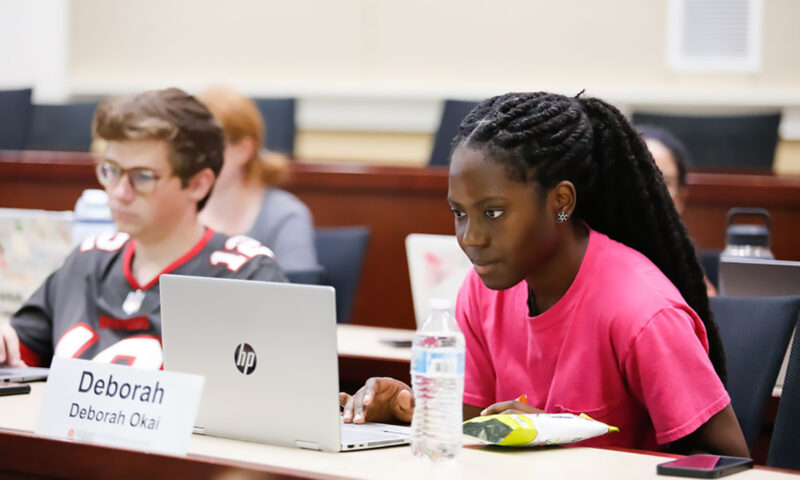It can be particularly challenging to continue your educational journey after completing your undergraduate degree. The mental hardship of getting through another degree—and at the graduate level—can cause potential burnout in students. It is good to have hobbies, activities, and interests to occupy your time to help make the transition to graduate school easier.
UVA’s M.S. in Accounting Program offers many helpful resources to establish a schedule for maintaining a healthy school and life balance. Once the semester begins and classes are underway, a familiarity starts to settle in, and you can find a routine that is easy to follow. Outside of your schoolwork routine, activities you can involve yourself in might often include spending time with friends, working out, and enjoying what Charlottesville has to offer. Other activities and interesting ideas may come from the M.S. in Accounting GCOM Council, which plans events for the program to socialize outside of group work and classes. Some of the M.S. in Accounting gatherings that we have participated in this year include a cookout event with the M.S. in Commerce Program, holiday parties, happy hour social events with faculty, and various catered events. Other activities we are looking forward to are the M.S. in Accounting formal event in the spring and our end-of-the-year celebration. The events are planned to engage students with other students and faculty to allow a break from classwork.
Outside of the educational aspect, there are enjoyable events to prevent burnout; however, the M.S. in Accounting Program also provides related educational activities with a more academic focus, such as study hangouts for classwork and studying for the CPA exam. The graduate lounge on the first floor of the McIntire School of Commerce facilities, Rouss & Robertson Halls, is utilized for these gatherings. There have also been luncheons to learn more about the CPA exam and future career options available. These resources have been shown to significantly benefit many M.S. in Accounting students. We will further discuss current students’ deeper interests and activities that help them prevent potential burnout in their graduate school career.
Reaching milestones such as getting into graduate school, graduating from your undergraduate institution, celebrating your first internship/job offer, and more can cause your work motivation to decrease. It is essential to find alternative incentives to prevent exhaustion from important work needed to be done throughout the day. I find it extremely helpful to reach out to other students in the program with similar interests to do things together after class or on the weekends. Reaching out to other students can help you in all aspects of your graduate career, from taking a break from school or having a group to study with. It is also easier to prevent burnout by relating and realizing other students are experiencing many of the same things. Many students are beginning to study for the CPA exam, and I have enjoyed sharing experiences and my position on studying. The shared experiences and interests with other students are what I believe keep productivity levels high and burnout low.
Kiersten Snyder (M.S. in Accounting ’22)
To stay organized throughout the week, Kiersten is efficient at getting her work done early to not experience burnout. Kiersten’s ideology when structuring her school week is to capitalize on time management when she does not have classes on certain days. She takes advantage of those days, so she has more time to do work, catch up on work, and work ahead on assignments. The message she wants to relay to future M.S. in Accounting students is the accomplishment she feels when having a lesser workload, which helps her not be burned out and could help you when beginning the M.S. in Accounting Program. In her free time, she tries at least once a week to do something fun; this includes exploring a new place in Charlottesville and hanging out with M.S. in Accounting students. Kiersten’s well-organized plan when completing schoolwork and trying new things is what keeps her from the exhaustion graduate school may pose on students.
Hannah Crump (M.S. in Accounting ’22)
The first thing that comes to Hannah’s mind when preventing burnout is to take time for herself. Hannah attended UVA as her undergraduate institution, so she has figured out perfect ways to stay focused on work when needed and to have some alone time to decompress. She stays focused on work and has an organized schedule by utilizing her Google calendar and the task list feature. She documents her assignment due dates, work schedule, and class times all in her calendar to determine when she has free time for herself. When she does have free time, she enjoys working out, hiking with friends, and finding new places around Charlottesville to study or grab coffee. She believes finding new places in Charlottesville also gets you away from the stress of being a graduate student. Practicing self-care and putting yourself first are how Hannah prevents potential burnout in graduate school.
It is essential to adjust and prevent burnout from schoolwork before coming to graduate school. Graduate school is challenging and can affect your motivation to perform well in your classes. Taking preventative measures now will help you succeed and engage in activities and hobbies with other students in the program for much-needed breaks. Finding a balance by exercising mindfulness will help prevent burnout and make for a smooth transition to graduate school.



